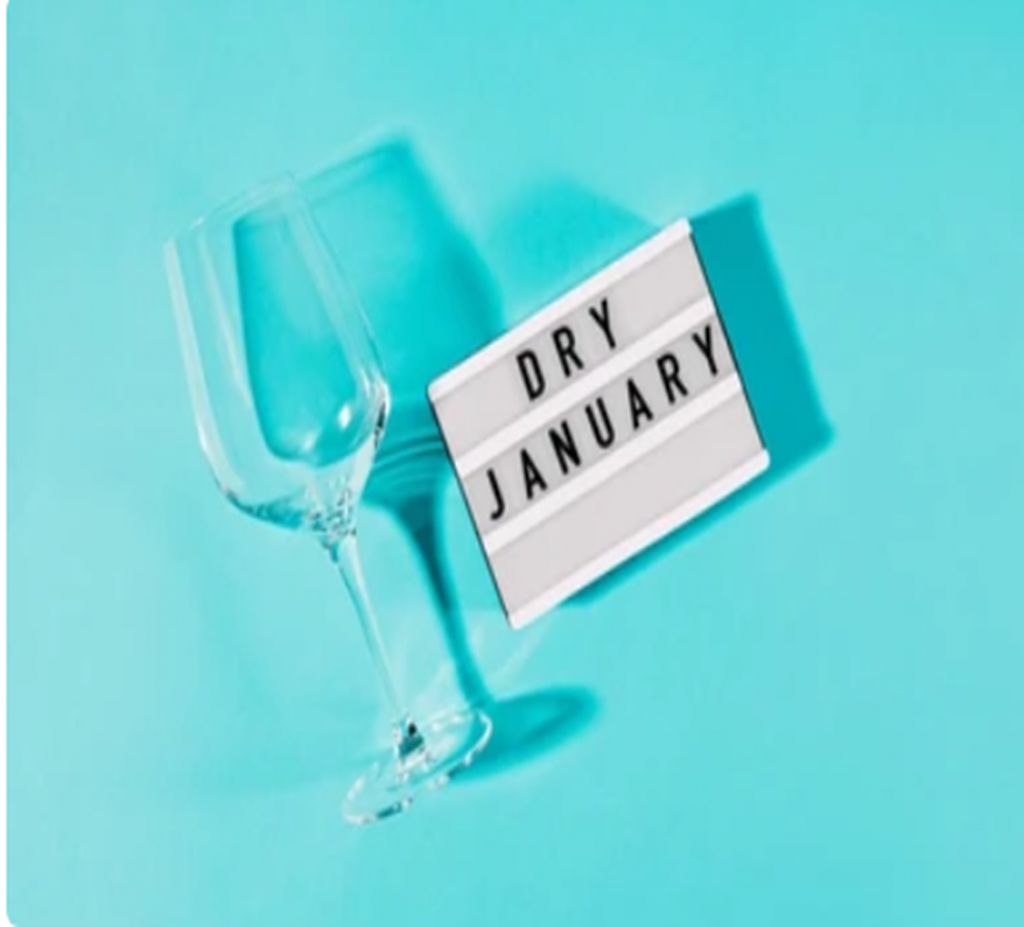
It’s the time of year when people commonly make New Year resolutions. Dry January is an annual campaign that encourages people to abstain from alcohol for the entire month of January. Led by Alcohol Change UK it aims to help individuals reset their relationship with alcohol, improve health, and experience the benefits of an alcohol- free lifestyle. The next Dry January will take place from January 1 to January 31, 2025.
Abstaining from alcohol has significant health benefits. Some of the changes that Alcohol Change state you can expect are improvements in energy, concentration and memory. They also note that it can help with weight loss. According to a 2018 report in the Lancet, by reducing your drinking, you also reduce your risk of strokes, heart disease and hypertensive disease and could increase your life expectancy. (1) Research has found that just four weeks without a drink can be enough to start lowering both blood pressure and heart rate and your risk of type 2 diabetes has already started to reduce (in one study insulin resistance came down by an average of 28 per cent), and your cholesterol levels should be starting to lower. (2) One research study found that just four weeks without a drink can substantially reduce liver ‘stiffness’ which is an early sign of liver disease. (3) Abstaining from alcohol also benefits your immune system.
Alcohol Change UK have a number of articles to support you including a list of family support services and advice on managing your drinking. They offer a number of interactive tools including the TryDry app which aims to help you drink more healthily.
Other organisations which offer support with alcohol dependency include Alcoholics Anonymous and SMART Recovery Drinkline offers free confidential support on 0300 123 1110 (weekdays 9am–8pm, weekends 11am–4pm). If you need support out of hours or on Christmas day please call the Samaritans on 116123.
The Library collections contain print and online resources on the topic of alcohol and alcoholism. Resources can be found by searching in the Library’s search tool, Discover. A selection of books on this topic are on display in the Library’s Reading Room as follows as well as posters providing information on ebooks and relevant journals.
Anderson, Peter et al. Alcohol in the European Union : Consumption, Harm and Policy Approaches. Copenhagen: WHO Regional Office for Europe, 2012. Print.
Blocker, Jack S, David M Fahey, and Ian R Tyrrell. Alcohol and Temperance in Modern History : An International Encyclopedia : Volume 1: A-L. Santa Barbara, CA: ABC-Clio, 2003. Print.
Desai, Nimesh. Prevention of Harm from Alcohol Use. New Delhi: World Health Organization Regional Office for South-East Asia, 2003. Print.
Print Books
Kemm, J. R. Alcohol and the Public Health : A Study by a Working Party of the Faculty of Public Health Medicine of the Royal Colleges of Physicians on the Prevention of Harm Related to the Use of Alcohol and Other Drugs. Macmillan Education, 1991. Print.
Robertson, Ian et al. Let’s Drink to Your Health! : A Self-Help Guide to Sensible Drinking. British Psychological Society, 1996. Print.
Voon, Tania, Andrew D. Mitchell, and Jonathan Liberman, eds. Regulating Tobacco, Alcohol, and Unhealthy Foods : The Legal Issues. London ; Routledge, Taylor & Francis Group, 2015. Print.
Ebooks
Babor, Thomas F et al. Alcohol: No Ordinary Commodity: Research and Public Policy. Oxford: Oxford University Press, 2010. Web.
Mahl, Thomas, and John O’Grady. Fast Facts : Liver Disorders. Second edition. Oxford, England: Health Press, 2014. Print.
Journals
Addiction
Alcohol and Alcoholism
Nature Review: gastroenterology & hepatology
[1] Wood, A. M., et al., 2018, ‘Risk thresholds for alcohol consumption: Combined analysis of individual-participant data for 599,912 current drinkers in 83 prospective studies’, Lancet 391(10 129), 1513–23.
[2] Teresa Aguilera, M., de la Sierra, A., Coca, Antonio, Estruch, Ramon, Fernández-Solà, Joaquim, Urbano-Márquez, A., 1999, ‘Effect of alcohol abstinence on blood pressure: Assessment by 24-Hour ambulatory blood pressure monitoring’, Hypertension 33, 653-7.
[3] Mehta, G., et al., 2015, ‘Short term abstinence from alcohol improves insulin resistance and fatty liver phenotype in moderate drinkers’, Hepatology 62(1), 267A






